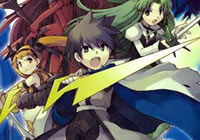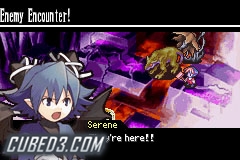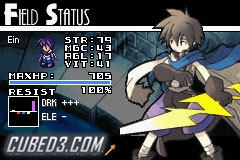Riviera: The Promised Land (Game Boy Advance) Review
By Matthew Evans  11.01.2007
11.01.2007

I am confused, really, really confused. I've reviewed my fair share of RPGs on this site but I'm starting to lose track of what an RPG actually is these days. I started off playing Final Fantasy VII with its customisable characters, its deepish storyline and turn-based battles that were more thought-based than twitch gaming. Then I worked my way through its sequels and prequels and broadened my view with Crystal Chronicles, Baten Kaitos, Tales of Symphonia and so on. Each game has tried to make itself stand out by breaking with tradition in some form, whether it is applying window-dressing to existing methods like Baten Kaitos' Magnus system or making turn-based gaming more reactionary through real-time battles,
Riviera follows the path of Ein, a Grim Angel working for the heavens and going on a quest to stop some locked away daemons from rising by bringing about Ragnarok. Of course, this will result in the destruction of Riviera and its peaceful fairy inhabitants. So, in typical JRPG anti-establishment fashion, you have to stop the daemons and prevent Ragnarok. Apart from some Nordic references, the story is nothing special, with the twists and turns it takes being sign-posted well in advance preventing any real surprises. Thankfully for Riviera, though, it follows the tradition of all great games of its ilk; it is not what is being said that matters, it is the way in which it is said. The dialogue is light, honest and humorous, with none of the preposterous grandstanding other games seem to favour. The developers were not afraid to make their characters fallible and in doing so have created a cast that is believable. There is none of the standard cardboard cut outs whom fit the pre-determined roles of broody lead, stoic mentor, annoying comic relief and the "strong" female love interest that couldn't break wind without the lead massaging her buttocks first. The game strikes the fine balance of not taking itself too seriously while not becoming a laughing stock.
The presentation for Riviera is of extremely high quality, the characters are wonderfully drawn and well animated, the backdrops look stunning and the various locations are diverse and detailed. While some of the enemy attack animations are a bit bland and boring, the ones that go with your attacks feel suitably powerful, yet it is not the graphics that steal the show. Considering the problems levelled at the GBA on the audio side, the soundtrack is fantastic. While the tunes are few in number, and hence get looped quite often, they never grow tiresome and help carry the battles. Various attacks and overdrive skills are fully voiced, with the speech being crisp and completely understandable, as well as being short so as to avoid sounding overly corny, and thus they really do add to the battle experience.

It is the gameplay, though, that makes Riviera really lift its head above competitors. Like the dialogue, it lacks the pomposity of many other games from its genre. It has stripped the RPG blueprint back to its basic core principals and rebuilt from there, and in doing so it has fixed a lot of problems that other games suffer from, whilst also bringing some new concepts to the table.
Much like a point-and-click adventure such as Monkey Island, you do not directly control your characters; rather interaction is handled by a set of menus. Each screen is its own separate map linked to other maps. You move between these maps by selecting the relevant direction and watch your party head off. Another option you have, however, is the search screen. By pressing 'A' you are presented with a new set of options that highlight points of interest on the screen. By investigating these you will either get some information about the game's world or hints that can be saved for later, find new items, encounter or even avoid enemies. All these actions do take TP, though, points gained from battle encounters. The better you do in battle, the more TP you gain, yet there always seems to be more actions then there are TP to spend on them, so quite a bit of thought and planning is required.
Thankfully in its bid to streamline the proceedings Riviera has managed to solve one of the issues that plagues almost all RPGs: random enemy encounters. Essentially Riviera has done away with them completely. The game has split fighting into two sections; you have got the main screen battles that are fixed and the same units will appear at the same place and same time every play through. These are the important ones as it is from these battles you gain your TP. The other way to fight battles is through the Practice option in the main menu. Here you get to choose when and where you fight; you even get to choose whom you fight against and it is in these battles that you will do the majority of your levelling up.

Levelling up is done through your items, in a similar vein to Final Fantasy IX where using the same item for a period of time permanently bestows that ability upon you. But instead of just giving you new abilities in Riviera, it also handles your statistic increases. Each item has a bar above it, which shows how many times it has to be used before it levels up the character, normally ranging from between three and twelve uses. The reason that you have to level up in Practice mode is because each item has a durability that only gives it a certain amount of uses. In main screen battles the durability decreases with each use, whilst in Practice mode though it does not. Therefore, you can happily level up without fear of destroying your item!
The actual battles themselves are quite normal. You select three members of your party, put them into one of two ranking orders and then fight your opponent. Where Riviera differs from other games is that your party is not equipped per-se, rather you select four items from your backpack at the beginning of each battle (weapons, armour or accessories) and use those during battles. Items can be used by more than one character yet rarely by everyone in the party and each item is used differently by party members. For instance, your main character Ein might use a staff to gain a double strike attack, while your resident healer Fia would use it to recover 30% of someone's lost health. Now there is more to battles than this; you and the enemy have attributes and are weak and strong against certain elements. Items do fixed attacks, Ein's sword swipe using the iron sword will only affect the front rank of the enemy, for example, as well as many other smaller things but in all honestly they are not necessary.
For the majority of the game the battles are far too easy and just straight attacks with the occasional overdrive will see you through enemies. Most of my restarts in the game were through the oft-frustrating reaction puzzles. At times you will be required to go through a reaction-based test, either pressing buttons in a timed sequence, pushing a button so many times within a time limit or stopping a marker as it races along a line at a specific point. In a game that for the best part is too easy, these are very unforgiving. The sequences can be overly complex or the accuracy required is far too high, especially when being used on a GBA screen. It took me an hour to get the better of one puzzle because I had to replay the entire batch of maps before coming to the puzzle again. That is another sticking point; saves are done whenever you enter a new map area and nowhere in-between. So if you wish to redo a puzzle or need to re-fight a battle for more TP, you have to start the whole section again and lose any progress you have made since that point. If you have spent quite a bit of time levelling up in the Practice menu it is all the more sickening. The game is essentially linear apart from the odd occasion. Once you have left a section of maps you cannot go back, thus any items you missed are gone forever.
Riviera is a solid game that goes back to the core of what makes a good RPG: likeable characters, a decent storyline and an enjoyable battle system. Sadly in its bid to get back to basics it has gone a bit too basic. The lack of exploration and real depth makes it a pleasant but forgettable experience. There is replay value in that you can try different paths and get one of the other endings, but due to a lack of any real impact on your playing experience it is unlikely you will. For those that have been put off by RPGs in the past, or are looking for a slight diversion, then this is a great game. But for fans of the genre it is more of an appetiser than a main course.

Cubed3 Rating
Very Good - Bronze Award

I thoroughly enjoyed playing the game, but the experience was somewhat hollow. It is not that the game does anything badly it just does not do them well enough to be considered great.

![]() 7/10
7/10
![]() 0
(0 Votes)
0
(0 Votes)
 None
None  Out now
Out now  Out now
Out now  None
None Comments
Comments are currently disabled

 Sign In
Sign In Game Details
Game Details Subscribe to this topic
Subscribe to this topic Features
Features





 Top
Top

